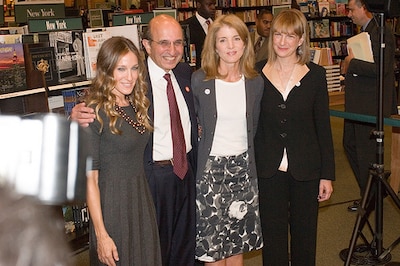
As Caroline Kennedy travels across the state in an unusual campaign to become its newest senator, New Yorkers are scrutinizing her work history. Among the questions being asked is how much time she actually spent at the city Department of Education when she headed its fundraising office for nearly two years starting in 2002.
Back in 2004, when Kennedy stepped down from her DOE position, David Herszenhorn wrote in the Times:
In an interview about eight months into her tenure, she would not say how often she worked at the department headquarters or how many hours she spent on the job, saying only, “I put in as much time as I can.”
This week, Wayne Barrett argues in the Village Voice that Kennedy’s reported fundraising totals at the DOE are merely “hype.” Kennedy’s resume is now being exaggerated by Klein and others to make her appear skilled, when in fact her “aura” underpinned her fundraising success, Barrett writes:
The former Klein aide who would only talk to the Voice anonymously said that he sat near Kennedy’s cubicle and that when she came in, she would “only stay a couple of hours or so.” He said she was brought into meetings with potential donors and added to the fundraising effort by her quiet presence and charm.
So we don’t know the exact structure of Kennedy’s work at the DOE. Why should we care?
In addition to the obvious reasons about whether Kennedy’s ready for public office, there’s also a public school point of interest.
Although Kennedy hasn’t been on DOE payroll since 2004 (when she earned $1), she is still the vice chair of the Fund for Public Schools, the department’s non-profit fundraising wing, and she has appeared as recently as October at its events. If she takes her star power to the Senate, DOE fundraising could lose out at a time when private donations could become more vital than ever.
